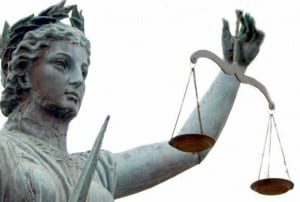What to Do When Plagiarism Isn’t Illegal
 Most people recognize intentional plagiarism as being ethically unsound. Plagiarism, after all, is the taking the works of others and passing them off as your own, either explicitly or implicitly. Most consider it a form of lying or cheating, which is a fair summary of the act.
Most people recognize intentional plagiarism as being ethically unsound. Plagiarism, after all, is the taking the works of others and passing them off as your own, either explicitly or implicitly. Most consider it a form of lying or cheating, which is a fair summary of the act.
But as ethically and morally wrong as plagiarism is, it’s not something that’s always against the law. In that regard, plagiarism follows countless other activities that are widely viewed as unethical but are not illegal by themselves. These include infidelity, other forms of lying (in most situations) and certain business practices of recent note. While they might lead to legal trouble in certain situations or taken to extremes, they aren’t, by themselves, illegal.
Because of that, while these things are frowned upon by society, the courts aren’t in a position to handle them because the law does not cover them. So what do you do when plagiarism isn’t illegal? It’s a tough question but the answer usually involved turning to a different kind of court for help.
Why Plagiarism Isn’t Always Illegal
Much of the time, plagiarism is illegal. Copying words, images, audio and video from others and passing it off as your own is often a form of copyright infringement. Most modern plagiarists run the risk of being copyright infringers as well as plagiarists just by the nature of their activities.
But just as not all copyright infringements are plagiarisms, not all plagiarisms are infringements. There are many ways one can completely legally plagiarize including:
- Plagiarize Works in the Public Domain: Once the copyright expires on a work, one can use it without fear of infringement. This includes plagiarizing it. Though many countries have moral rights that can extend past the copyright of the work, generally plagiarism is just as much of a non-infringement as attributed copying.
- Non-Copyrightable Works: Likewise, many creative works don’t qualify for copyright protection at all. This includes works created by the U.S. government (though not state governments), fashion designs and creative works not fixed into a tangible medium of expression. Other elements of a work, including titles, ideas and concepts also don’t fall under copyright protection though many consider their use without attribution to be plagiarism.
- Non-Infringing use: Finally, there are some cases where the work is copyrightable and not in the public domain but the use of it is non-infringing, such as when only small portions are used, leading to a possible fair use argument. Not all uses of a work are infringing and attribution is only a small factor in determining if a use is fair or not.
In short, there are many cases where plagiarism would fall outside of what one would outside of social or professional norms but not outside of the law. Those cases can’t be handled with lawsuits, DMCA takedown notices or other legal actions.
Instead, you have to find another approach for dealing with these cases.
Approaching Legal Plagiarism
When dealing with legal plagiarism, it might seem as if there isn’t much of a way to handle the situation. After all, someone who cares little enough about ethics to plagiarize isn’t likely to care when you call them unethical.
Fortunately though, many people have to answer to more than one court and most frown heavily on plagiarism. This includes both academic and professional environments. Though the standards for what is and is not plagiarism often vary, generally every profession has at least some standards they operate by.
This is why, if someone plagiarizes you (or others) in a professional environment, the best place to take is is often their supervisor, whether there is a legal issue or not. Though the legal system can take years to churn out an response, which may still be inadequate, the professional hierarchy takes much less time and can produce a better result.
However, if there is no such person or entity to take the issue up with, such as with a blogger, the issue gets thornier. Though you can call out the plagiarist publicly, that’s a risky strategy and could actually cause more legal trouble for you than the plagiarist. Furthermore, it doesn’t always work.
Often times, the best thing that you can do is research the case thoroughly and see exactly how far the plagiarism goes. The more evidence you compile and the more people you work with, especially other victims, the better your chances of a successful outcome are. If you attempt to go it alone, it becomes a “your word vs. mine” dispute with little hope for resolution.
This is unfortunate though because many cases of very serious plagiarism get ignored and the plagiarist let off not because they evidence was weak, but the person who observed the plagiarism can’t marshall enough interest or support.
However, this is often much more unfortunate for the plagiarist who continues on only to have the allegations resurface later along with any new ones that may be filed. In short, a mild setback and a quick lesson learned becomes a career-ending tragedy down the road.
Still, that’s poor consolation for anyone who feels plagiarized without recourse, especially when the world doesn’t seem to care about the situation.
Bottom Line
In the end, there are no good solutions here. No easy way to resolve non-legal cases of plagiarism and, as unfair as the legal system is, the court of public opinion is always going go be much more unfair on these matters.
Still, as was pointed out on the Copyright Librarian blog recently, it’s important to not overstate the legal ramifications of plagiarism. Not only because you are likely depending on the same freedoms that the plagiarist is abusing, but, for resolution purposes, because it makes you appear to be a bully and to be irrational.
The last thing you want is for the plagiarist to have the moral high ground and that’s why handling these cases is a delicate matter. Wither you are dealing with supervisors or the court of public opinion, how people perceive you and your claims matters far more than it would in a court.
It’s not fair, that much is certain, but it is the reality of dealing with plagiarism outside the legal system.
Want to Reuse or Republish this Content?
If you want to feature this article in your site, classroom or elsewhere, just let us know! We usually grant permission within 24 hours.
